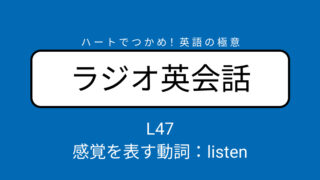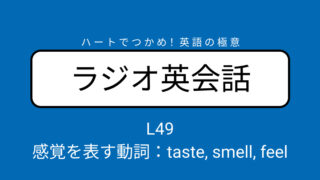NHKラジオ英会話のディクテーション「感覚を表す動詞:hear」L48 2022/6/15

ディクテーション
講師陣の英会話を書きとり(スクリプト)
大西先生、クリスさん、ろーざさんの英会話部分を書きとってみましょう!(大西先生のギャグもできるだけ書きとります。)
Opening
Ohnishi: 人生万事塞翁が馬、タクマ君よかったね。
ラジオ英会話、ハートでつかめ英語の極意、講師の大西泰斗です。
Roza: Hey everyone. Akino Roza here. Hey Chris!
Chris: What?
Roza: Did you hear about Ohnishi Sensei?
Chris: No, what happen?
Roza: I don’t know. Let’s find out.
Chris: Ah, Chris McVay here. But I do know that I feel totally engages to this program.
Ohnishi: さ、それではさっそく始めていきましょう。
ダイアログ和訳の後
今日はありませんでした
Practice 10:00
Chris: OK, it’s practice time. I’m sure you remember the pair, look and see, look … the motion was outwards and see was inwards. I’m looking I’m looking and, ah now I see it. Well, it’s the same with this pair listen and hear. Listen is outwards, I’m listening, I’m listening and then inwards with hear. So, it’s the same feeling, right? Should we try that then?
Roza: And remember, only think in English.
Chris: So, let’s practice these sentences. “Did you hear that noise?” So, you listen, you listen and then … inwards it comes and you catch it. “Did you hear that noise?”
Very good. One more, “Did you hear the news?”
Roza: Next example, “I’ve never heard of anyone by that name.”
One last time, “I’ve never heard of anyone by that name.”
Chris: OK, and the next one, “I heard him play the piano.” So, the noise of the piano comes inwards into your brain and you hear it. So, after me, “I heard him play the piano.”
Last time, “I heard him play the piano.”
Roza: Last example, “Did you hear that Ken had an accident?”
So, here you imagine the information of Ken had an accident, coming in. “Did you hear that Ken had an accident?”
Excellent job.
Chris: Well done, guys.
Ending
Chris: Calorie-free bread, I’ve never heard of such a thing.
Roza: Sensei, you don’t need calorie-free bread. You need calories with the amount of exercise you are doing.
Ohnishi: Yes, exactly. というわけで今日はこの辺で。
All: Bye!
~ ディクテーションした内容やその解釈などに、聞き間違いや認識違いがある可能性はあります。ご了承ください


